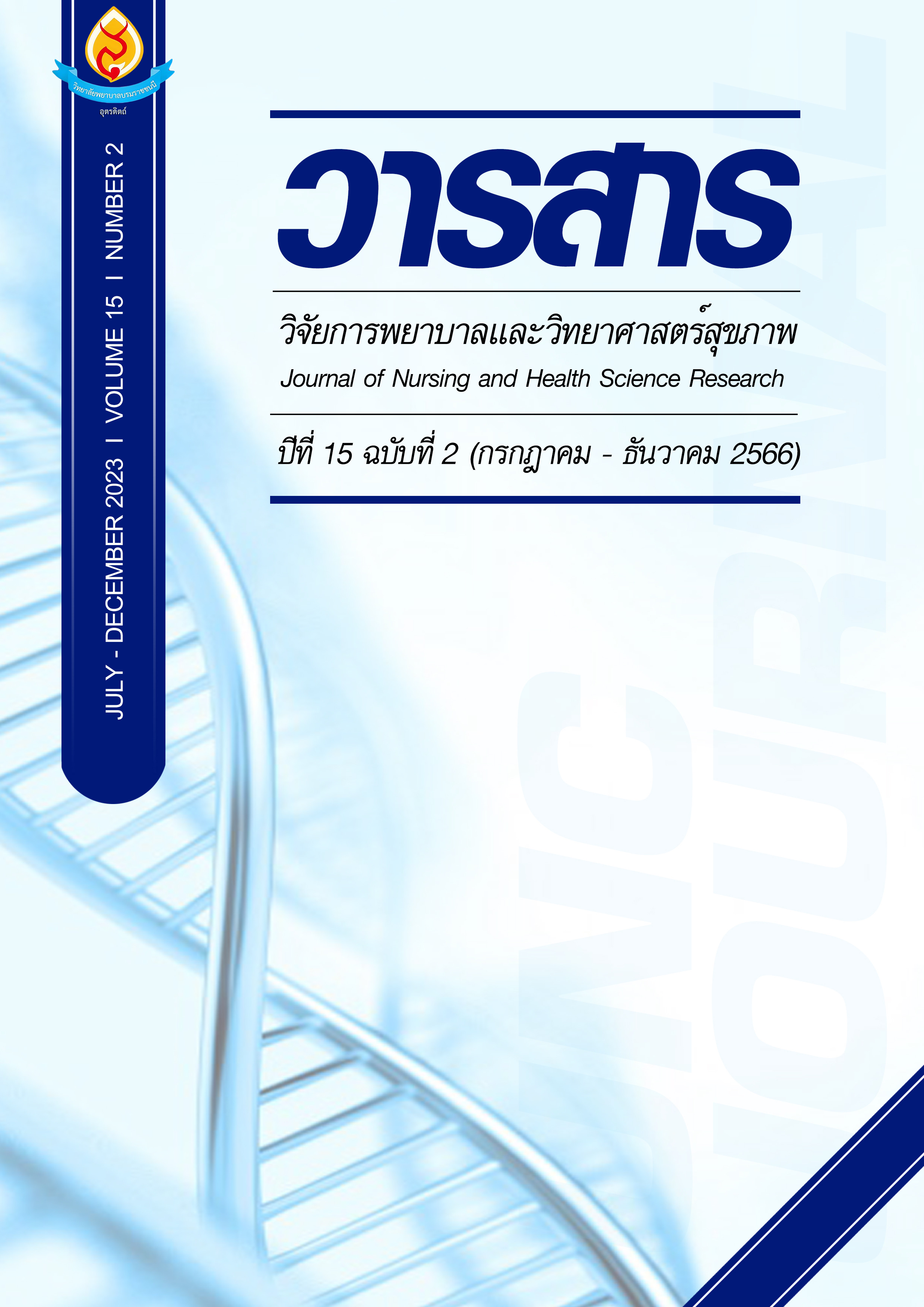ความสัมพันธ์ระหว่างการรับรู้สมรรถนะของตนเองและการสนับสนุนทางสังคมกับทัศนคติ ในการเลือกบำบัดทดแทนไตของผู้ป่วยไตเรื้อรังระยะที่ 4
Main Article Content
บทคัดย่อ
การวิจัยนี้เป็นการวิจัยเชิงพรรณนามีวัตถุประสงค์เพื่อ 1) ศึกษาการรับรู้สมรรถนะของตนเอง การสนับสนุนทางสังคม และทัศนคติในการเลือกบำบัดทดแทนไตของผู้ป่วยไตเรื้อรังระยะที่ 4 2) ศึกษาความสัมพันธ์ระหว่างการรับรู้สมรรถนะของตนเอง การสนับสนุนทางสังคม ต่อทัศนคติในการเลือกบำบัดทดแทนไตของผู้ป่วยไตเรื้อรังระยะที่ 4 กลุ่มตัวอย่าง คือ ผู้ป่วยไตเรื้อรังระยะที่ 4 ที่อยู่ในการดูแลของโรงพยาบาลส่งเสริมสุขภาพตำบล ทั้ง 15 แห่ง ในอำเภอเมือง จังหวัดพะเยา เลือกกลุ่มตัวอย่างแบบสุ่มอย่างง่าย (Simple Random Sampling) จำนวน 82 ราย เครื่องมือที่ใช้ในการวิจัยประกอบด้วย แบบสอบถามข้อมูลส่วนบุคคล แบบประเมินการรับรู้สมรรถนะของตนเองของผู้ป่วยไตเรื้อรังระยะที่ 4 แบบประเมินการสนับสนุนของครอบครัวของผู้ป่วยไตเรื้อรังระยะที่ 4 และแบบประเมินทัศนคติในการเลือกบำบัดทดแทนไตของผู้ป่วย ไตเรื้อรังระยะที่ 4 มีค่าความเชื่อมั่นโดยใช้สูตรสัมประสิทธิ์อัลฟาครอนบาค เท่ากับ .81, .91 และ .91 ตามลำดับ วิเคราะห์ข้อมูลด้วยสถิติเชิงพรรณนา สถิติ Pearson’s correlation และ multiple stepwise linear regression
ผลการวิจัยพบว่า 1. การรับรู้สมรรถนะของตนเองอยู่ในระดับสูง ร้อยละ 82.93 (𝑥̅= 29.30, SD =4.27) การสนับสนุนทางสังคมอยู่ในระดับสูง ร้อยละ 85.37 (𝑥̅= 34.70, SD = 4.33) ทัศนคติในการเลือกบำบัดทดแทนไตอยู่ในระดับสูง ร้อยละ 78.05 (𝑥̅= 88, SD = 11.39)
2. ปัจจัยด้านความสัมพันธ์พบว่าการรับรู้สมรรถนะของตนเองและการสนับสนุนทางสังคมมีความสัมพันธ์เชิงบวกอย่างมีนัยสำคัญทางสถิติ (r= .460, P<.001) ทัศนคติในการเลือกบำบัดทดแทนไตกับการรับรู้สมรรถนะของตนเองมีความสัมพันธ์เชิงบวกอย่างมีนัยสำคัญทางสถิติ (r= .449, P<.001) และทัศนคติในการเลือกบำบัดทดแทนไตกับการสนับสนุนทางสังคมความสัมพันธ์เชิงบวกอย่างมีนัยสำคัญทางสถิติ (r= .482, P<.001) โดยพบว่าการได้รับการสนับสนุนทางสังคมสามารถทำนายทัศนคติในการเลือกบำบัดทดแทนไตได้ดีที่สุด ร้อยละ 23.2 (β=.349, p=.01) และการรับรู้สมรรถนะของตนเอง ร้อยละ 29.8 (β=.289, p=.01)
ดังนั้นหากทีมสหสาขาวิชาชีพมีการส่งเสริมการรับรู้สมรรถนะของตนเองและการสนับสนุนทางสังคม ทำให้ผู้ป่วยไตเรื้อรังระยะที่ 4 มีทัศนคติในการตัดสินเลือกบำบัดทดแทนไตที่ดีและอาจทำให้สามารถเลือกวิธีการบำบัดทดแทนไตที่เหมาะสมกับบริบทของตนเองได้
Article Details

อนุญาตภายใต้เงื่อนไข Creative Commons Attribution-NonCommercial-NoDerivatives 4.0 International License.
บทความหรือข้อคิดเห็นใดใดที่ปรากฏในวารสารวิจัยการพยาบาลและวิทยาศาสตร์สุขภาพ เป็นวรรณกรรมของผู้เขียน ซึ่งบรรณาธิการหรือสมาคมศิษย์เก่า ไม่จำเป็นต้องเห็นด้วย และบทความที่ได้รับการตีพิมพ์เผยแพร่ถือเป็นลิขสิทธิ์ของวารสารวิจัยการพยาบาลและวิทยาศาสตร์สุขภาพ
เอกสารอ้างอิง
Ahmadi, S. M., Jalali, A. & Jalali, R. (2018). Factors associated with the choice of peritoneal dialysis in Iran: Qualitative study. Open Access Macedonian Journal of Medical Sciences, 6(7), 1253-1259.
Apiwatnakorn, A. & Chaiprasitti, S. (2019). Renal dialysis refusal in end-stage renal disease patients under universal health coverage scheme in Uttaradit Province. Srinagarind Medical Journal, 34(6), 546-551. (in Thai).
Bandura, A. (1997). Social learning theory. New Jersy: Englewood Cliffs.
Chaisiwamongkol, P. (2021). Factors related to decision making for non-dialysisin chronic kidney disease stage 5 patients. Journal of Health and Environmental Eucation, 6(2), 1-12. (in Thai).
Chylinska, J., Lazarewicz, M. A., Rzadkiewicz, M., Adamus, M., Jaworski, M., Haugan, G. & Wlodarczyk, D. (2017). The role of gender in the active attitude toward treatment and sociodemographic factors as moderators. Biomed Central Geriatrics, 17(284), 1-10.
Gantagad, T. & Kasemkitwattana, S. (2014). Predictive factors in the funtional ability of terminal chronic renal failure patients undergoing heemodialysis. Thai Journal of Nursing Council, 29(4), 92-104. (in Thai).
Hanpaiboon, K. & Pratoomsoot, C. (2019). Factors influencing patient health behaviors for delaying the progress in stage 3 - 4 chronic kidney disease patients at Khlongkhlung Hospital, Khampangphet Province. Thai Pharmaceutical and Health Science Journal, 14(2), 53-61. (in Thai).
Health data center (2022). Number of patients with chronic kidney disease receiving services at the hospital, classified by stage (Work Load). Retrieved from https://hdcservice.moph.go.th/hdc/main/index.php.
House, J.S. (1981). Work stress and social support.Reading. MA: Addison-Wesley
House J.S., Kahn, R.L., McLeod J.D. & Williams, D. (1985). Measures and concepts of social support. In: Cohen S, Syme SL (Eds.). Social support and health. San Diego: Academic Press.
Khantason, A., Thongthawee, B. & Pairojkittraku, S. (2022). The effects of a social support program on adherence to hypertension control behaviorsand clinical outcomes among chronic kidney disease patients receiving hemodialysis. Nursing Journal, 49(4), 225-237. (in Thai).
Luemongkol, R. (2020). Factors associated with self-care behaviors among patients with chronic kidney disease at Khonsawan hospital. The Office of Disease Prevention and Control 10th Journal, 18(1), 16-26. (in Thai).
Nakhamin, K., Luankaew, M., Thongsombut, T. & Thingchure, B. (2018). Family participation in providing care to delay in progression of chronic kidney disease patients. Princess of Naradhiwas University Journal of Humanities and Social Sciences, 5(special edition), 160-171. (in Thai).
Paypat, S., Pakdevong, N. & Binhosen, V. (2021). The association among knowledge, self- efficacy and self-management behaviors in patients with chronic kidney disease. APHEIT Journal of Nursing and Health, 3(2), 22 - 36. (in Thai).
Pitsawong, W. (2021). Prevalence of chronic kidney patients and factors affecting decision-making on renal replacement therapy in the nephrology department of Surin Hospital in a period between 2014 and 2020. Medical journal of srisaket surin buriram hospitals, 36(3), 675-684. (in Thai).
Raj, R., Brown, B., Ahuja, K., Frandsen, M. & Jose, M. (2020). Enabling good outcome in older adult on dialysis: A qualitative study. Biomed Central Nephrology, 21(1), 1-12.
Ryan, R. M. & Deci, E. L. (2017). Self-determination theory basic psychological needs in motivation, development, and wellness. New York: The Guilford Press.
Sangsee, P., Tanatwanit, Y., Kunsongkeit, W. & Moungkum, S. (2020). Factors related to self-determination to select dialysis modalities in patients with end-stage renal diseases. The Journal of Faculty of Nursing Burapha University, 28(3), 53-65. (in Thai).
Sawasdee, P., Vuttanon, N. & Soivong, P. (2022). Factors related to the choice of treatment methods among persons with pre-dialysis chronic kidney disease. Nursing Journal, 49(4), 151-162. (in Thai).
Sawatphol, C., Pengpinit, T., Sananikorn, A. & Srisuraphol, W. (2017). Care for elderly dependents in the Northeast of Thailand. Journal of MCU Peace Studies, 5(Special issue), 387-405. (in Thai).
Sodsongkid, N. & Bosittipichet, T. (2023). Factors associated with rejection of renal replacement therapy in the end stage renal disease patients in PhraNakhon Si Ayutthaya Province. Regional Health Promotion Center 9 Journal, 17(2), 590-603. (in Thai).
Srita, N., Aungwattana, S. & Tamdee, D. (2023). Factors related to health behaviors among persons with chronic kidney disease in community. Journal of Nursing and Health Science Research, 15(1), 139-159. (in Thai).
The Nephrology Society of Thailand. (2018). Guideline of hemodialysis treatment and plasma filtration for kidney disease patients. Retrieved from https://www.nephrothai.org. (in Thai).
The Nephrology Society of Thailand. (2020). Annual report Thailand renal replacement therapy 2007-2020 (th). Retrieved from https://www.nephrothai.org. (in Thai).
Unaphak, P. & Rattanamanee, K. (2015). The correlation factors of self-care behaviors to prevent complications among patients with chronic kidney disease at Somdetphraphutthalertla hospital in Samutsongkhram Province. The Public Health Journal of Burapha University, 10(2), 44-54. (in Thai).
Wongsree, C. & Assalee, R. (2016). Experience of using social support in end stage renal disease patients receiving hemodialysis. Thai Red Cross Nursing Journal, 9(2), 132-144. (in Thai).
Wungrath, J., Rerkkasem, K., Saengyo, S., Pongtam, S. & Pinmars, N. (2018). Factors predicting food consumption behavior of hemodialysis patients with end stage renal disease at Maharaj Nakorn Chiang Mai hospital. Health Systems Research Institute, 12(4), 625-635. (in Thai).
Yoomuang, P. & Suphannakul, P. (2023). Factors predicting self-management behaviors among patients with chronic kidney disease stage 3 in suphanburi province, Thailand. Malaysian Journal of Public Health Medicine, 23(1), 272-278.


